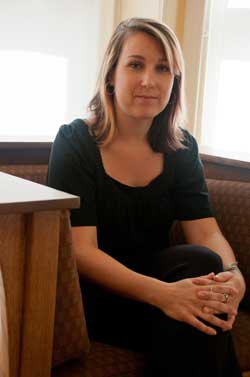Filed Under > TC Community
Finishing School for an Aspiring Change Agent
Megan Hanley has worked in education's trenches. Now she wants to learn to work smarter
By Siddhartha Mitter
Megan Hanley grew up in awe of her grandmother, who taught for 30 years in Chicago public schools. So when Hanley, after graduating from college in California, received a Teach for America assignment back in Chicago, she expected not just a homecoming but a chance to follow in the footsteps of her professional and family idol.
But what she found on the job, at a Head Start pre-school on the South Side, was profoundly disappointing. And it motivated Hanley, who is starting a dual master’s degree in Early Childhood Education and Special Education at TC, to become a fighter for change.
The center was dysfunctional, she says. Classes of young children were frequently understaffed. Management was lax and turnover was high. “In three years there, I quickly became a veteran,” Hanley says. “I saw so many people come and go.”
Hanley was especially shocked by the gap in circumstances between young, fresh college graduates like herself and the center’s low-paid, longtime staff.
“Women I worked alongside who didn’t have degrees earned eight dollars an hour,” she says. “One co-worker had been there for 13 years with no raise.” And these problems were not limited to her center, Hanley found. She learned they were common elsewhere as well in the urban pre-school world.
“And then you wonder why pre-K is not better?” she asks. “How hard would you work under those circumstances?”
At TC, Hanley plans to build from her experience in the Teach for America setting, where she earned her certification but, she says, “missed out on seeing excellent teachers in action.” She particularly hopes to draw on TC’s intellectual and policy leadership in serving as an agent of change in urban education.
Not that she’s been idle on that front. After her two-year TFA commitment, Hanley stayed on for another year at the pre-school. She found herself in the midst of efforts to unionize her colleagues at her center and four others run by the same community group.
A visit from an organizer from the Service Employees International Union (SEIU) prompted the unionization drive. Hanley says co-workers gathered at each other’s homes, on their own time, for months, and fought back intimidating messages by the employer and its lawyers to discourage the effort.
“We won by a few votes,” says Hanley. She was glad she could leave on a high note, and see her colleagues newly empowered by a union contract.
But Hanley knows that victory was only one small episode in urban education’s big battles. And she says that despite her frustrations with what she sees as the inadequate training efforts of the TFA program, her Chicago experience opened her eyes to the world of education reform. Indeed, she came to TC, she says, in part because there is so much important experimentation taking place in New York City’s public schools.
A politics major in college, Hanley may be naturally drawn to education policy issues and brass-knuckle fights over labor conditions and other concerns. Yet she wants to have her biggest impact in the classroom—channeling the spirit of her grandmother. Someday, Hanley says, she may even try to start a teacher-run school. In the meantime she hopes to teach pre-K in an elementary school setting.
“Frederick Douglass said ‘It is easier to build strong children than to repair broken men,’” Hanley says. “If this country cared more about pre-K, we could do so much more.”
Published Friday, Aug. 31, 2012
